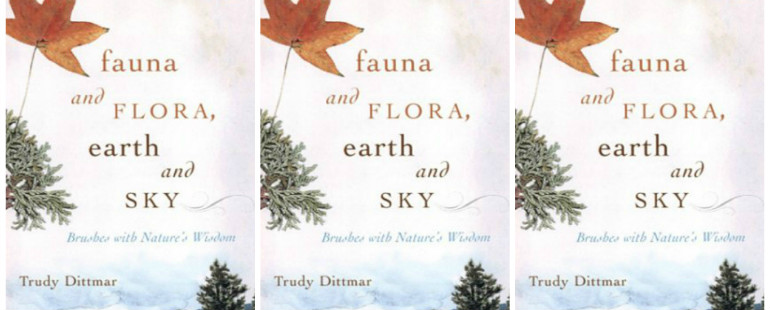Trudy Dittmar Explores the Uncanny Valley

Nature writing may not be everyone’s cup of tea, but add some cinema and cultural-political intrigue and you’ve got some evocative reading. Such is the case with Trudy Dittmar’s Fauna and Flora, Earth and Sky: Brushes with Nature’s Wisdom, a collection of ten essays from University of Iowa Press.
The most fascinating essay from this collection, “Wolf Show, Truman, Ersatz Moon,” uses nature to introduce us to what Dittmar’s thinking, but she swirls in a sort of existential take on a movie to discuss a large, far-reaching issue of today’s society: the uncanny valley. She’s not talking about artificial intelligence or robots or the stuff of sci-fi. She’s talking about how we can hardly tell the difference between reality and what’s on the screens before our zombified faces. The essay weaves two stories about a public event of watching wolves in their “natural” habitat and The Truman Show, a ‘90s movie starring Jim Carey.
The essay starts when Dittmar witnesses a public frenzy over a wolf-watching event. The pack of wolves was brought to Yellowstone from Canada in the late 1990s as part of the Northern Rocky Mountain Wolf Recovery Program. The pack dons bands and collars that send radio signals to capture its location and its every movement. People come from all over the country on annual excursions to watch the pack through giant telescopes. They believe they’re seeing wolves in the wild when in fact wolves are rather elusive and rarely seen.
This voyeuristic approach to appreciating nature leaves Dittmar with jarring cognitive dissonance. If we’re willfully being duped, is it because reality is too much to bear, or is it because we can no longer bare reality? Consider the wolf watchers, for instance: they’d not likely see a single one, if the wolves weren’t contained. They certainly wouldn’t see any in action, “on the kill” as these audience members claim—believe— they’re watching. What they’re actually seeing through those gigantic scopes is a gray blur.
“But there was something about the way they said it: wolves on a kill. It seemed it was just a kick to them, a mere shallow excitement at the materialization of a preconceived idea,” Dittmar writes. “The way they said it, it seemed clear that what they’d seen was essentially unreal to them, the way blood and guts on the screen isn’t real.” And it isn’t. Nor are most tourist experiences, reality shows, or social media friendships.
The wolf relocation from Canada to Yellowstone happened around the same time The Truman Show (and its partner movie Ed TV) came around, some twenty years ago. The movies were early cultural criticism of the burgeoning presence of reality television. Then only a small handful of reality TV shows existed. Today more than 300 such shows exist, and the center of one of them, The Apprentice, is running for President. How’s that for a new reality?
Dittmar’s observations are so clear, so spot on, that it’s compelling to imagine her composing while traversing the uncanny valley she’s discussing. In the screen she uses as a metaphor to demonstrate how inauthentic life has become in the last twenty years since we’ve become conscious that “it’s a contrivance;” yet our consciousness gets stuck between what is contrived and what isn’t because our daily lives are filled with as much contrivance as reality.
Dittmar’s nonfiction tackles stupendous, stupefying topics that reveal maturity, literary grace, and empathy—none of that narcissism or disrespect for the power of prose easily found elsewhere in today’s nonfiction. Hers is wonderful writing that, despite the occasional redundancy, takes readers on a mental and emotional journey of the larger world. Other essays in the collection include, “Cache,” a moving story about a near success in falling in love and respecting privacy of dead animals, and “Cows, Arrogance, and the Natures of Things,” a compassionate essay that seeks to find that fine line when environmentalism loses sight of nature.
Dittmar has published essays in Orion, Georgia Review, and the Norton Book of Nature Writing. She’s won a Rona Jaffe Foundation Writers’ Award, a Whiting Award, and a Pushcart. Her work is a reminder of how refined literature can be. Her observational skills and parabolic contemplation of perspective are refreshing. Whether she’s writing about a frozen doe or the uncanny valley that is today’s zeitgeist, her nature writing has something for the urban and the exurban reader.



